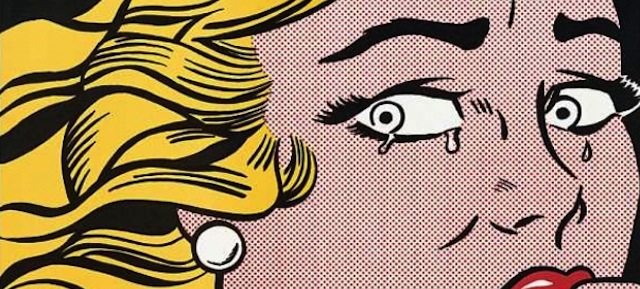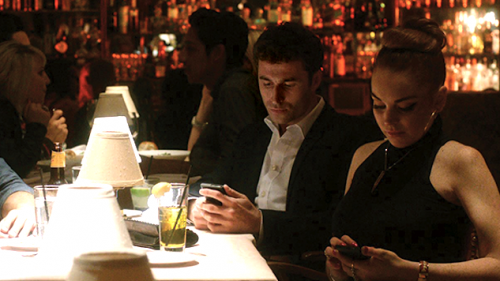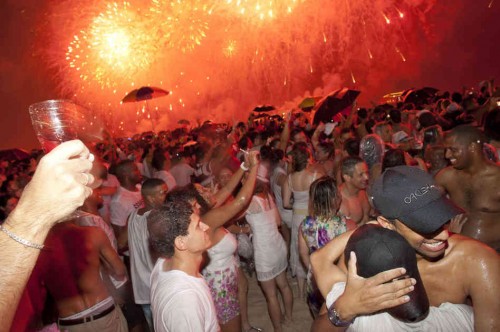
FOMO’s not the whole story – nor is it new.
 The Boston Magazine this week published a history of “Fear of Missing Out“, tracing its beginnings, like a careful epidemiologist, back to 2004, at Harvard Business School. Of greater interest were its comments on FOBO, Fear of a Better Option (more precisely, Fear that a Better Option Exists, but FOBO’s easier than FBOE, so there it is):
The Boston Magazine this week published a history of “Fear of Missing Out“, tracing its beginnings, like a careful epidemiologist, back to 2004, at Harvard Business School. Of greater interest were its comments on FOBO, Fear of a Better Option (more precisely, Fear that a Better Option Exists, but FOBO’s easier than FBOE, so there it is):
But this mentality had its costs: McGinnis and his group found they couldn’t commit to anything. Working with the rudimentary tools available to them (cell phones and address books), they developed complex algorithms to plan their social lives. Every Friday night, they’d frantically crisscross Boston and Cambridge, cramming in face time with anyone and everyone they knew—even ignoring the Killington ski house they’d rented for the winter for fear that leaving town would mean missing out.
McGinnis and his group eventually gave their anxiety a name: Fear of a Better Option, or FOBO for short. While tongue in cheek, the term expressed a heretofore unspoken truth. Says Phil Tseng, a fellow HBS grad, “It’s actually an amazing acronym, because it captures the essence of life.”
It’s a helpful acronym, and the Search for the Perfect Bar, or sneaking suspicion it’s out there, certainly exemplifies the “better option” thing. While it’s certainly no accident the phenomenon was first elucidated, in its current guise, at place where everyone has “so many options” and “so much potential”, I think Boston Magazine’s history could be a bit near-sighted. For instance, Jewish writers, several thousand years ago, described a situation in which a man and a woman were placed in a paradisaical garden. There was only one alternative to the life they were living, and it was clearly worse. Yet they took it. And the serpent, it’s worth noting, didn’t quite trick them. In last week’s Economist, a writer wisely noted of Putin’s MH17 propaganda, “their aim is not to persuade but to cast enough doubt to make the truth a matter of opinion.” Such was the serpent, aiming not to persuade so much as to give the humans’ restlessness room to assert itself.
It’s worth noting that the restlessness interpretation of Eden wasn’t fully-formed until the mid-1800s, in Kierkegaard‘s Concept of Anxiety. Born to the socially-mobile merchant class in a flourishing city, perhaps Kierkegaard was enabled by new social conditions to perceive the anxiety motif of Eden. He called Adam’s and Eve’s state a “dizzying freedom”, and that freedom could only be fully expressed through choosing the alternative. If someone places you in a room containing everything your heart desires, but with a button in it – “don’t press that, this’ll all go away” – how long would you last? Our curiosity belies an innate malcontent, a reaching-beyond ourselves. (Søren Aabye himself had the prospect of a wonderful romantic life, and he opted out – can we hear echoes of self-excoriation in his analysis of Adam? Certainly the new freedoms – romantic, social, professional – of his time helped crystallize the anxiety motif.)
Fast-forward to twenty-first century America, land where the pioneer, not the settler, is the national archetype, endless striving for the city on a hill, where the New is so enshrined in the national imagination that Turner could view pioneerism as America’s architectonic force. The Venetian merchants arguably marked the beginnings of economic mobility, the Northern Italian city-states of political self-determination (endlessly shifting alliances from HRE to Rome, and amongst themselves)… but why do many date the end of the Middle Ages to 1492? A new adventurism became possible, a new self-determination with almost no contextual restraints, relative to what came before. Possibilities opened up and ramified endlessly from then to the present day, and the intoxicating freedom (SK again) had, as its consequence, the burden of choice.
I could be in Switzerland right now, doing the international ‘thing’, or maybe I could be banking in New York, or maybe in a graduate program (English? Religion? Linguistics?). Both freedom and awareness of what other options are like are required; maybe that’s why Facebook and Instagram seem to exacerbate the problem. But as the Eden story makes clear (whether you believe it’s divinely inspired or merely ancient Hebrew mythology), such restlessness is innate, and it’s amplified only by circumstance. Unfortunately, our restlessness had helped shape a world, helped shape circumstances, which do amplify it. We have crafted a world where anything is possible, but such dizzying possibility surely inhibits our ability to choose something and learn to enjoy it.
There are, I think, two decent approaches to the problem. The first is the giving of comfort: if you’re woofing in France and doing weekends at the beach, don’t send too many snapchats to your friend still living in Philadelphia with her parents. Often, of course, we play up the best of what we’re doing to get affirmation it’s the Real Thing, and that can contribute to a cycle of collective envy. Second – and far more difficult – we would all be a bit happier if we resisted the ‘anything’ idea: rather than increasing potential options ad infinitum, ad nauseam, as an end in itself, it may actually do good in the long run to limit potential. Those are probably stop-gap, in the first place, and un-implementable, in the second, and in the third, only address the circumstantial side of the problem. I was at a Cistercian Convent – of all places, probably the one most free from FOBO – about a year ago. They did their matins, made cheese, and contemplated the Holy Mother and the Cross, the endpoint of human possibility, every day, yet you could still here a slight note of defensiveness in the younger ones’ voices during Q & A. The FOBO thing likely isn’t going away anytime soon; wherever the point of no return was (1492? Gutenberg? Eden?), we’ve probably crossed it. But getting beyond trendy acronyms, the language of epidemiology, and ’04 HBS – to see such restlessness as fundamentally ingrained in the human spirit – and as a side-effect of our desires to self-actualize… that would at lest be a starting-point for talking about it.
As to the end-point? I’m in the dark there, but a poem by Eliot, begins with a nostalgic reminiscence for a romantic near-miss at a place called “Burnt Norton” (for him, a living FOBO) perhaps ends on a hint:
Desire itself is movement
Not in itself desirable;
Love is itself unmoving,
Only the cause and end of movement…

COMMENTS
2 responses to “FOMO and the Fear of a Better Option”
Leave a Reply















Thank you, Will.
[…] at the time.) He called his indecision “Faustian” doubt, or, in more colloquial terms, the fear of a better option: the creeping inkling that there was more for him in life than mere theology. He feared that in […]